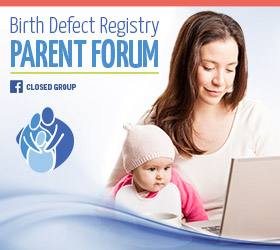How to Find Out More About Your Child’s Birth Defect or Disability
Parents of a child with a birth defect or disability often feel bewildered by medical terms they don’t understand. They may also be confused about treatment options and have difficulty in locating the latest information on their child’s condition.
Everything you want to find out about your child’s birth defect is available if you know where to look. You can become “the expert” on your child’s disability even if you don’t have a medical degree or any special education.
Here are some suggestions that other parents have used to educate themselves:
The Internet…Today, parents have more information available than ever before. Through the internet, you can search for information in the National Library of Medicine, On-Line Mendelian Inheritance in Man, and through other resources. You can also order professionally prepared research reports on your child’s condition from The Health Resource.
Your local library…The public library is also a valuable resource in your search for information. Librarians can answer many questions over the phone. If you go to the library, they can help you locate information in magazines, books and newspapers. Many libraries offer special tours of their facilities that can help acquaint you with all the research resources that may be available.
Hospital libraries…Most hospitals maintain medical libraries for the physicians on staff. If you call your largest local hospital and explain that you are looking for information about your child’s birth defect, the medical librarian will usually give you permission to use the facilities of their library. A medical library will have medical resources that are not generally found in your public library. Also ask if the hospital has a library for use by parents because many pediatric or children’s hospitals have libraries set up for parents.
University libraries… Find out which colleges or universities in your area offer a nursing or medical curriculum. If the school is publicly supported, you may be allowed to check out books if you pay a small donation to the university and receive a patron’s courtesy library card.
Inter-library loan… If you have found listings of medical articles that are not available in any of your local libraries, you can use a service called inter-library loan. Call your public library and ask for the inter-library loan department. Tell the librarian that you are looking for medical information about your child’s birth defect. Then give them the complete book title or listing of the articles(s) you want. Your request will go on the “medical circuit.” This means your librarian will contact other libraries all over the country until the information you need is located. The book or journal article(s) will be sent to you through your library’s mail service.
A medical dictionary… It is a good idea to buy your own medical dictionary so that you can look up unfamiliar terms you may come across as your read medical books and journals. A medical dictionary can be purchased from your local bookstore.
A Physicians Desk Reference (PDR)… A PDR is like an encyclopedia of all prescription medications. You can look up almost any prescription drug and find the latest approved information on precautions, contraindications and adverse reactions that have been associated with the drug. A PDR is a good addition for the home library of a family who wishes to take a more active part in their health care. PDRs are available at your local bookstore.
Fact Sheet by:
Birth Defect Research Children, Inc.
www.birthdefects.org







